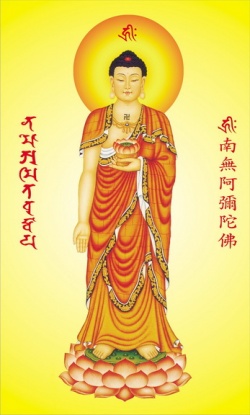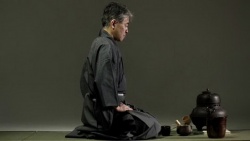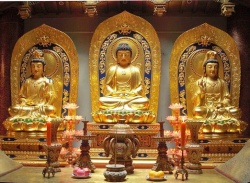The Dhyana-Samadhi Meditation Absorptions - Part 4
The Joy and Bliss of Dhyana
To attain the first Dhyana, many people understand that you must liberate yourself from your Body and Mind to experience Mental Joy and physical bliss. However, nobody asks why this is so. When you detach from the Body to attain some measure of calm, you will naturally experience some measure of Mental Joy. For instance, those people who undergo near-Death experiences often feel a great Joy because of being released from the clutches of the physical Body. But in terms of the sequences of the Spiritual path, if you loosen your hold on your Mind and Body without losing your jing, then your jing will become full and transform into chi. Next your chi will become full, your energy channels will open, your vitality will freely flow everywhere, and even your ching-se will become activated. How could you not feel a state of Joy and bliss with all these accomplishments happening?
These events will naturally produce physical bliss (comfort), and if you become absolutely flooded with bliss while withdrawing from normally bothersome physical distractions, your Mind will experience Emptiness, freedom and Joy. In other words, as your disturbing emotions settle down, Joy and bliss will both naturally arise. Since Body and Mind are interrelated, bliss and Joy will intensify as you loosen the tight restrictions normally binding your Mental and physical states.
Eventually these two factors will pervade your Body and Mind to the extent that Joy will help further your Mental tranquility, and tranquility will give rise to a deepening of physical bliss. This generation of bliss will in turn help heighten your level of Concentration, and the bliss together with Concentration will both become more refined the longer and more devotedly you cultivate Spiritual practice.
This entire process begins at the time you start to become free of Afflictions and stabilize your emotions. If you can reach a state of internal tranquility, you can get rid of confusion and Ignorance and give birth to Prajna Wisdom. Prajna Wisdom clarifies or sees the way in which our Mind manufactures thoughts and emotions, and thus, it can penetrate through our Illusion of being an inherent self. It is the empty awareness knowing that does not need words--our bright nonconceptual knowing awareness--and it lets us ultimately realize our fundamental nature. When you attain tranquility and have calmed your desires and Afflictions, Prajna Wisdom can burst forth like flames on dry wood.
With Prajna Wisdom you can more readily abandon obstructions on the Spiritual path, and then definitely climb the stairs of cultivation attainment. To attain the first Dhyana you must therefore relinquish unwholesome Mental factors that interfere with tranquility and Prajna, such as the five poisons, and you must withdraw from sensual desires. Abandoning an Interest in sensual desires means detaching from the Body and thus becoming able to match with the higher realms of Spiritual attainment. It also helps you maintain those attainments, through nonleakage, once you reach them. For instance, if higher Spiritual beings have bodies different than ours, how can clinging to our bodies assist in gaining Spiritual achievements?
To summarize the matter, we should say that freedom in both Mind and Body, which results in Mental Happiness and physical bliss, are necessary preconditions for attaining the first Dhyana. In the higher stages of Meditation, Joy and bliss are actually viewed as gross Mental and physical factors that inhibit further Spiritual progress on the path. Nevertheless, in attempting to gain entry into the first Dhyana, they are necessary components of the overall Spiritual process.
We can therefore say that physical bliss and Mental Joy are necessary at the earliest stages of Spiritual attainment, not just because they are generated as a result of Mental Concentration, but because they contribute to generating Concentration. For instance, when the Mind is joyful, it naturally settles into tranquility (stability). As Shakyamuni Buddha stated, bliss increases as tranquility increases, and bliss serves to perfect Concentration. That is one of the reasons that physical bliss from chi cultivation is emphasized so predominately in the Tibetan school of Esoteric Buddhism and its various tantric yoga practices.
If you are able to cultivate a Feeling of disgust for both the Body and the World which motivates you to detach and separate from your physical nature, then gradually your chi will transform and your mai will open so that you can obtain the necessary factors of Mental Joy and bodily bliss that characterize the first Dhyana. That is the purpose behind the white skeleton visualization technique, but in practicing this technique you must also joyfully imagine Offering away your organs and flesh in order to allow the Joy and bliss of the Dhyana concentrations to arise.
In other words, if you practice Concentration while prohibiting Joy and bliss from arising, you will not be able to reach even the first Dhyana; you can never attain any Spiritual states through a Mental clamping down, or suppressive Mental force.
Before you achieve this stage, however, you will still have to go through all sorts of Suffering and troubles because there is no way to escape the painful nature of the World until you succeed at your Spiritual cultivation. In fact, it is the pain of the World which motivates many people to turn toward Spiritual cultivation in the first place, for cultivation provides the only sure means to escape from the World of Suffering. Even if you live a Life of Virtue, unless you succeed at Spiritual cultivation you will have to return to the World once again for many more lives, and who knows what experiences your subsequent lives will bring? When your cultivation stage is so low, you cannot even pick where you will go and what you will do next, because Karma will have you in its grips until you cultivate to the stage where you can become master of the process. That is when you will be able to come and go as you please.
Another reason people sometimes cultivate is because they want health and Happiness; they run after cultivation because they are running after Joy and bliss. However, the Joy and bliss of the first Dhyana are different from the Happiness and Joy of ordinary people when they make a lot of money, get married, engage in sexual intercourse, become famous, and so on. It is a Joy and bliss of a much higher level than any physical or material concerns.
For lack of a better word, the Joy and bliss of the first Dhyana constitute "Dharma Happiness" which is very difficult to comprehend unless you actually achieve this stage of cultivation. We can borrow a Tibetan analogy which says that Mental Joy is akin to spotting water when you are thirsty in the desert, whereas physical bliss is like actually satisfying that thirst. Nonetheless, these experiences of Joy and bliss cannot even begin to match the Joy and bliss of the four Dhyana. Thus, it is that people today only know the names of the four Dhyana and their characteristics without truly being able to comprehend the actual meaning of these states.
Buddhism, for instance, is nothing but an organized set of cultivation techniques and Prajna Wisdom teachings, and it will eventually decline over time as fewer people end up cultivating to reach these states of Samadhi and Prajna attainment. As it decays, fewer and fewer people will become able to verify all its other teachings and explain them to others, and as people's Wisdom Life diminishes, fewer people will be able to accept these teachings as well.
An accomplishment in Spiritual attainment is therefore necessary to keep the paths of Spiritual cultivation alive. When religions no longer produce individuals with Samadhi and Prajna attainments within their ranks, they quickly turn into ossified Power structures that actually look down upon the Spiritual path and accomplished cultivators while becoming depleted of the ability to guide others to Spiritual Liberation. This is a calamity, but it is the way of this World.
Retreat Practices
If you really want to spiritually cultivate, you must lay a solid foundation of Meditation practice and then go into Retreat for a certain period of time to fully devote yourself to uninterrupted cultivation practice. It is normally useless to do this, however, unless you already have made great progress in transforming your jing, chi, shen and mai, whereby you know what you are doing. Otherwise you would just be kidding yourself that you were cultivating. You would end up wasting time or using up your good Fortune to enjoy a period of solitude, or would simply be torturing yourself for no reason at all.
If you really want to reach Enlightenment, it is natural to go through all sorts of Suffering because of the great value of what you are trying to attain. Furthermore, you will definitely go against the grain when you are giving up old habits and desires in order to create a new Life, so a bit of Suffering is to be expected on the Spiritual trail. Hence, hard work is to be expected, and the only way to guarantee any degree of success in Spiritual endeavors is to put in the hard work of cultivating Samadhi.
There are two general paths through which you can attain one-pointed Concentration. The first method requires that you go into isolated Retreat like Milarepa, Gampopa or Lady Tsogyel. Undertaking an isolated Meditation Retreat, like Vasubandhu's brother Asanga, does not guarantee you will see the Tao in this lifetime. It might still require one or more additional lives for you to attain Enlightenment, but anyone who is devoted to attaining the Tao will eventually attain it because it is always there, and firm desire will clear the path for Spiritual attainment.
In actual fact, there is no one who has not achieved an actual Concentration in a former lifetime, and since the seeds of these experiences lie dormant in the Alaya Consciousness, the various Samadhi and Dhyana are within the reach of all. Perhaps an individual will fail to attain these states of Concentration in this lifetime because of insufficient practice at mentally nonclinging, but they can expect to succeed in a subsequent Life of effort if they just make the necessary preparations, especially if they lay a strong Spiritual foundation in this Life. The problem is, will they have the cultivation teachings available in that lifetime? If they do not put sufficient cultivation efforts into this one, the future availability of accurate Spiritual teachings is unlikely.
To be strictly accurate, any human being of determined will and unrelenting Faith can expect to attain Tao within at most three lives, and perhaps this is your third Life already! But you will need accurate cultivation teachings to follow, and you will need to cultivate both Prajna Wisdom and virtuous Merit to break the pattern of Ignorance that shields this realization, which is why the Stage of Accumulation (of Merit and Wisdom) precedes the Stage of Intensified Preparatory Exercises in Spiritual practice.
The Stage of Merit and Wisdom Accumulation means you must first study Spiritual teachings and tread the path of good deeds and virtuous ways while simultaneously practicing to gain some level of Spiritual accomplishment. From doing this, you will finally be able to "see the path" and truly begin to cultivate correct Spiritual practice. Before people "see the path" or "see the Tao," most of their cultivation efforts will have little Spiritual Power but after experiencing a genuine stage of Emptiness and selflessness, they will truly know the way, and their efforts will have a great effect. That is why this is the normal sequence of Spiritual practice.
The other means for obtaining one-pointed Concentration is the Mahayana way of remaining in the World and Suffering for the sake of others while cultivating all the while. This road of practice is really practicing austerities, for it definitely involves much more pain and Suffering than simply going into Retreat to meditate in a cave!
In other words, the Mahayana Spiritual path of cultivation is to try to attain one-pointed Concentration in the midst of worldly hustle and bustle, and you constantly test yourself in the World of troubles rather than in the silence of isolation. This road of practice really has you proving the Truth of Emptiness. You have to put lots of work into perfecting your outward behavior at the same time that you are cultivating your Mind, and you must learn to look at everything that comes your way as if it were a dream. The results of this sort of practice are very strong, for as Zen master Hakuin said, "Meditation in the midst of action is a billion times superior to Meditation in stillness."
This Mahayana means of cultivation is actually more difficult than a Hinayana Retreat in solitary seclusion because you need a great unselfish Mind to accomplish this way. You need to Love and accept people, and you need mercy and Compassion to take care of others and do the difficult things you vow to do while receiving slander, misunderstanding and Suffering in return. Working for the benefit of others involves a lot of pain and trouble, yet you must still find the time to meditate in all this mess; otherwise, you will just become an ordinary Charity worker with worldly rather than worldly and Spiritual Merit. In that case, Life will quickly pass by, and while you will accumulate Merit for the path, you will achieve no level of Spiritual attainment whatsoever.
You might accumulate a vast amount of Merit like a Mother Teresa or Albert Schweitzer in this way, but you will achieve little in terms of true cultivation attainment when you do not engage in Meditation practice as well. Meditation practice is the only way to purify the Mind and attain Spiritual states, for you cannot clean the Mind by Thinking pretty thoughts, or by replacing old thoughts with new ones.
On the Mahayana path you have to face many people and many troubles, but if your vows of mercy and Compassion are great enough, sometimes you can reach Tao even quicker along this route. This is possible because your Merit will grow astronomically, and because you will develop sufficient Prajna Wisdom to be able to detach from, or skillfully deal with, all the various distractions, disturbances and disruptions of modern Life. Those following the Hinayana road usually just become Meditation teachers, but those following the Mahayana path can become generals, kings, saints and all sorts of other occupations.
As to those people who undertake the isolated forest, mountain and cave retreats to accomplish the stage of cultivating their kundalini, some of them never experience the tumo Phenomenon prior to their seclusion. Therefore they must initially resort to visualizing the kundalini Fire in order to "strike a match" to get it started. If you do the various exercises necessary to awaken the kundalini, the tumo Fire will always appear when you achieve a state of one-pointed Concentration. The key, once again, is achieving a state of single-mindedness, which is why it is treasured in all religious schools (though not necessarily by the orthodox Power structure of such schools, which typically fear that a practitioner's successful cultivation attainment will undermine their own religious authority).
The Discipline Required of the Path
As to the topic of discipline, which is required for cultivating kung-fu and Spiritual attainment, discipline is already included within the nine Samadhi. We have not discussed discipline as a separate feature of the path, because if you achieve single-minded Concentration, it means you are already practicing discipline to a tremendous extent. In fact, when you are in one-pointed Concentration, your discipline is actually stricter than any ordinary individual following some external code of conduct. Forget about dietary codes, "do-this-and-not-that," the number of times you should pray per day and so on-none of that is real discipline because only Samadhi constitutes real discipline. These other things are just behavioral constraints that have no absolute standings themselves, but vary according to time and place. The real discipline is to attain Samadhi, and you break the rules of discipline when you lose this stage of Spiritual attainment.
While someone who holds to external behavioral discipline is to be praised, someone who "sees the path" and attains Samadhi does not talk about holding to it anymore because they spontaneously perform disciplined conduct at all times. Samadhi gives rise to natural discipline--the disciplined Mind of Samadhi--and all the artificial disciplinary rules of the World are just imitations of this true discipline. Disciplinary codes are designed to help you enter into Samadhi, and when you achieve that saintly state, you might even choose to break the rules of conventional discipline in order to teach others, as the famous Monk Jigong often did. But only people of the highest attainment dare do so in a public way.
Many individuals can achieve the single-minded Concentration of the first Dhyana, but you can tell that they are still treading a deviant Spiritual path if they become arrogant and proud, if they lose their affection for others, if they become selfish and do not want to be bothered by anything, if they become lazy and just want to meditate, or if their minds become so tight that they start measuring who is Good and bad in terms of Spiritual kung-fu and other attainments.
After you attain kung-fu, a real practitioner realizes that everybody can attain kung-fu if they but simply practice. It is like riding a bike in that everyone can achieve this feat of dynamic Balance if they simply practice. Thus, the Flower Ornament Sutra says, "I now see that all Sentient beings everywhere fully possess the Wisdom and virtues of the Enlightened ones, but because of false conceptions and attachments they do not realize it."
Everyone is fundamentally Enlightened, everyone has Prajna Wisdom, and everyone can attain Samadhi and kung-fu. People need only unveil or uncover what already exists, and that unveiling requires the work of cultivation effort that entails the dropping or clinging to Thought realms and Mental states. This particular realization that everyone shares in the same fundamental nature helps you to become even more affectionate and compassionate as you progress in Spiritual practice, for this is the correct attitude in all religious striving.
Mencius commented on this point in saying that a major problem with people is that they all want to be the teachers of others, meaning that we all want others to listen to us because we feel we are right, more clever, or more brilliant than the rest. Most of us fall subject to this improper, arrogant attitude. Mencius did not say you should not become a teacher. He just meant that you should not become arrogant and try to Lord your Knowledge or opinions over others.
Therefore, there is a tradition in Esoteric Buddhism and Indian yoga that one should go and search for his or her Guru. You actually go and inspect them, and meanwhile they inspect you; you check them out, and they check you out. The big questions both sides are looking to answer is whether the other person is humble or not, has integrity or not, is greedy or not, and whether or not they have great mercy.
Getting into any of the eight absorptions, which are common to all the World's cultivation schools as well as to all the beings in the Three Realms, requires that you be able to reach single-minded Concentration. All the World's cultivation methods have this as one of their goals, so you should not let yourself get confused on this point or become side-tracked by other issues. Nothing is really sacred or holy in the ultimate sense, but since the calm abiding of one-pointed Concentration is the way to Tao and the basis of all forms of cultivation, it is the method supreme to be prized above all others. When we can finally achieve the first level of single-minded Concentration, we will enter into a state of Joy and bliss of the first Dhyana.
The particular level of Joy and bliss is different for each of the four Dhyana. Ordinary people, too, can experience Joy and bliss, but this is much different than the Joy and bliss of these transcendental states. When an individual, for instance, makes money through Gambling or engages in sexual intercourse, this gives rise to the ordinary man's Joy and bliss. So what exactly is the level of Joy and bliss you can achieve through Meditation? This is a big question.
Shakyamuni only provided us with the general principles for this answer, so you have to go and study the matter yourself to make some progress in your understanding. To go into it layer by layer would require an incredibly detailed Knowledge of Life science, medicine, psychology and all sorts of other studies, which is a task set before the cultivators of the next several hundred years. We can just summarize matters by saying that the Joy of the Dhyana is a wonderful psychological experience while bliss is akin to a wonderful physical sensation. Joy refers to Happiness in the Mind, and bliss refers to the physical Body.
When someone wants to evaluate the status of various cultivation practitioners in the World, the Samadhi and Dhyana are the real kung-fu of Spiritual cultivation rather than whether or not an individual can shoot lights out of their Body, walk through walls, foretell the future, fly through the air and so on. The Samadhi and Dhyana stages of Meditation are the common province of all sorts of Spiritual cultivation schools, so they are not theoretical constructs but the actual result of Spiritual cultivation practice.
The prophets of the Old Testament, Christian saints of the Middle Ages, Immortals of the Tao school, sages of Confucian cultivation, Arhats of Buddhism, rishis or seers of ancient Indian yoga, and so forth were all Spiritual greats precisely because they could achieve the realms of Samadhi. If they did not achieve Samadhi, they could not be prophets, they could not become Christian saints, they could not become Taoist Immortals or Confucian sages, etc. in the first place. Their Spiritual status was the result of their own disciplined hard work at Samadhi and Wisdom cultivation achievement rather than some spontaneous gift from Heaven.
This is why we talk about this particular measuring scheme of practice, rather than go into all the superpowers and the stages of attainment to which psychic abilities might correspond. You can become a saint or sage when you attain Samadhi, but to do so you must cultivate discipline. This is the discipline of practice, the discipline of nonleakage, the discipline of Merit accumulation, and the discipline of Constant Mindfulness.







